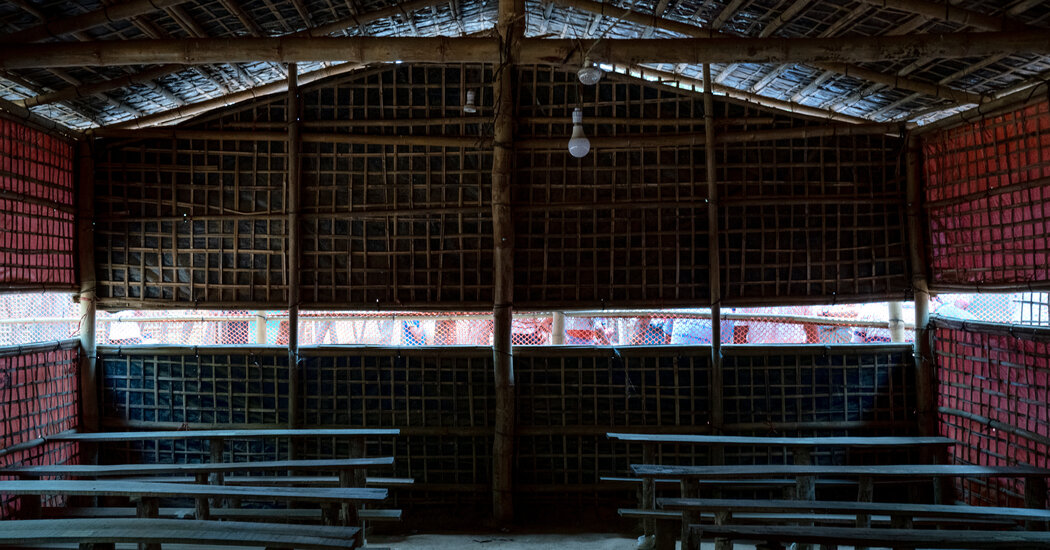
KUTUPALONG CAMP, Bangladesh — Every morning, Mohammad Reyaz, a sixth grader, appears in uniform outside his school for Rohingya refugees in the Cox’s Bazar area of Bangladesh.
And every morning, he returns home with a sullen face after finding its gate locked. Bangladeshi authorities shut the school down last month. It is one of more than 30 such closings of community-run schools that have sent waves of frustration and disappointment across the densely crowded refugee camps, home to about 400,000 school-age children, according to UNICEF, the U.N. Children’s Fund.
No one knows when Mohammad, along with 600 of his classmates, will be able to go back to the few rooms made of bamboo slats that they had called their school.
“When I see my school empty, I feel sad,” said Mohammad, who had attended the school for 22 months before it was closed. “I liked it more than my home.”
About half the population of the sprawling camps is younger than 18, and Rohingya community leaders, soon after arriving, began setting up free schools.
In December, Bangladeshi authorities began a crackdown on these schools, calling them illegal, but without trying to provide any alternatives and without removing the prohibition on the Rohingya attending local schools outside the camps.
The school closings have come amid a broader effort by the Bangladesh government to tighten its control of the camps. Last month, government authorities destroyed thousands of shops there, according to Human Rights Watch.
The authorities say the schools have been closed because Rohingya community leaders failed to secure permission to open them. The authorities have, however, granted permission to UNICEF and a few other agencies to operate schools for younger children in the camps.
“One just cannot open a school whenever you want,” said Mohammad Shamsud Douza, a top official at Bangladesh’s Office of the Refugee, Relief and Repatriation Commissioner. “We don’t know what they teach in these schools. It could be anything.”
But Nur Khan Liton, a human-rights activist and the former secretary-general of Ain O Salish Kendra, Bangladesh’s largest human rights group, said the government’s primary motivation was concern that the schools would encourage the Rohingya to stay on the Bangladesh side of the border.
“They fear if the next generation of Rohingyas are educated here, they will never leave the country,” Mr. Liton said.
Those who set up and teach at the community-run schools said their intention was the opposite: to smooth their students’ eventual return to Myanmar by including robust instruction in Burmese language and culture and by offering a curriculum that broadly mirrors what’s taught there in similar grades.
Mohammad Showfie, a teacher, said his life had revolved around the now shuttered camp school where he and 15 colleagues had worked, hoping to train future generations for productive lives back home.
“We don’t want to stay in Bangladesh forever,” Mr. Showfie said. “We want to go back to our country when the situation allows, but for that we need to educate our children.”
Several parents, hoping to return to Myanmar one day, said they viewed the community schools as crucial to easing their children’s readjustment and improving their job prospects.
“Our hopes of returning back depended on these schools,” said Feroz ul-Islam, whose son, a fifth grader, is without a place to learn after authorities demolished dozens of schools last week, including his son’s. “We pray someone will help rebuild those schools so that children can go back to classes. Their future depends on these schools.”
Both parents and teachers point to the schools’ Burmese-language instruction as evidence of intent to return.
The Rohingya have their own language, mutually intelligible with the Chittagonian language spoken in this part of Bangladesh. But the instructional language of the camp schools has chiefly been Burmese, which many parents consider more practical, as it is the language spoken by Myanmar’s dominant ethnic group.
Aid groups operate about 3,200 learning centers for the younger children in the camps; UNICEF runs 2,800 of them. But these centers offer only ABC’s-level instruction starting at age 4, although students as old as 14 are allowed to attend to learn basic reading and math skills.
With the approval of the Bangladeshi government, UNICEF has begun a pilot program teaching about 10,000 children in grades six to nine in a curriculum based on what they would learn in a Myanmar school at that age.
“The demand for education in the Rohingya community is massive,” said Sheldon Yett, a UNICEF official in Bangladesh. “We need to be creative and flexible in how we ensure that these children can continue to go to school.”
For high school-aged students, the schools set up by Rohingyas were the only option, and their closure means there are tens of thousands of teenagers in the camps with little to fill their days.
“Now, they are loitering around, which puts them at risk of being trafficked,” said Razia Sultana, a lawyer and a Rohingya rights activist. “They can indulge in bad things, and the consequences of that will be unthinkable.”
The largest school shut by the authorities was Kayaphuri High School, set up by Mohib Ullah, a Rohingya community leader who had also been documenting the ethnic cleansing that had occurred in Myanmar and who was killed by gunmen last year.
Hundreds of students there were taught the sort of curriculum typical of a high school in Myanmar: the Burmese language, along with English, mathematics, science and history.
On a recent afternoon, around two dozen ex-students from Kayaphuri and other Rohingya-run schools recently shut down were playing marbles as a mosque loudspeaker broadcast the muezzin’s call to prayer.
Some said they spent their days wandering around the settlements. Others said they dreamed of a better life outside the camps.
“After our school was shut, I’ve nothing to do. I play here and there all day,” said Mohammad Ismail, a seventh grader. “Sometimes I help my mother with home chores. I don’t know what will happen next.”
Some Rohingya educators are refusing to give up.
Before crossing over to Bangladesh in 2017, Dil Mohammad taught at a government school in Myanmar, and on a recent day, he was busy teaching a group of children. Colorful posters, with handwritten words for the names of the days of the week and the months in both English and Burmese, adorned the walls of his shelter, used as his informal classroom.
Among his students was his daughter, Dil Ara Begom, 13.
“I don’t know if I will ever be able to go to school,” Dil Ara said. “I want to be a doctor. But if our school remains shut, I don’t know how I will study.”
Even before the government crackdown, the education situation was dire for many Rohingya children. The percentage of Rohingya girls attending classes at the community-run schools was very low. And in the months leading up to their 2017 expulsion from Myanmar, nearly all Rohingya students were unable to go to school because of restrictions on their movement imposed by the Burmese government.
Human rights activists said instead of closing schools, the Bangladeshi authorities must do all they could to help prepare Rohingya children for a life outside the camps.
“Education is a critical component to lift Rohingya refugees out of the extremely difficult situation that they are in,” said Saad Hammadi, a South Asia campaigner at Amnesty International. “It will empower them to claim their human rights and to speak for themselves.”
Fatema Khatun, the mother of Mohammad Reyaz, the sixth grader, said she dreams of her son becoming an influential person who can better the lives of his suffering community.
Sitting on a plastic chair in her tarp shelter, which lacks electricity, she said her hopes were dashed when she learned her son’s school had been shuttered.
“I fear that he will forget what he learned,” said Ms. Khatun, 44. “If he doesn’t go to school, he will never be able to change his fate.”
Saif Hasnat reported from Kutupalong, Bangladesh, and Sameer Yasir from Srinagar, Kashmir.




